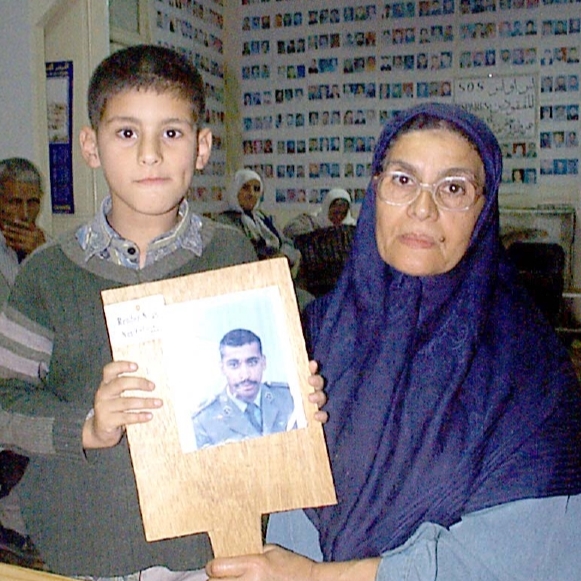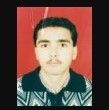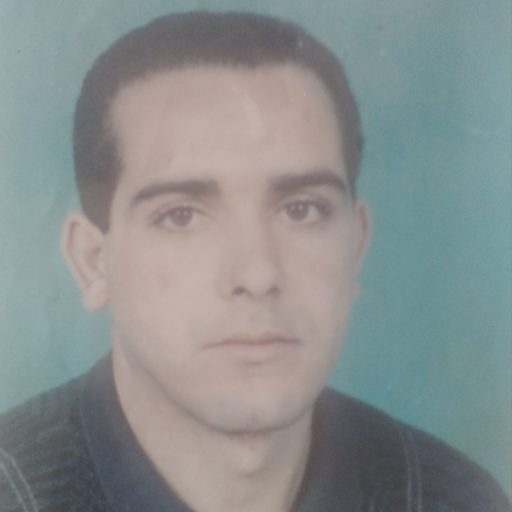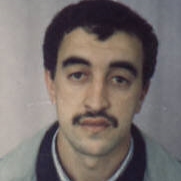
Brahim El Boathi
Date of arrest: 1994-01-17
Forces responsible: Police
Summary
Brahim El Boathi was married and the father of two children. Prior to his arrest, he was employed as a soldier at the Bouzareah barracks. On January 17, 1994, he took a bus from the Place des Martyrs, Algiers, to go to work. He was arrested at a police checkpoint in the Climat de France neighbourhood, in Oued Koriche municipality, Bab el Oued district, Algiers wilaya. His family has not seen him since then.
Steps taken
After January 17, 1994: Brahim El Boathi’s family requests that an investigation is initiated immediately after his arrest.
January 19, 1994: Brahim El Boathi’s mother meets with Baïnem Court Prosecutor in Algiers, whom she tells about her son’s disappearance. The Prosecutor calls various police stations in Algiers. The prosecutor speaks with an officer, A.Z., of the station of Oued Koriche who confirms that he himself has arrested Brahim El Boathi.
His mother visits Oued Koriche police station, where she meets with A.Z. When he discovers who she is, he becomes violent. He calms down after reading the letter from the Prosecutor, which mentions that he has arrested Brahim El Boathi and killed him. A.Z. refuses to provide her with a death certificate.
On the advice of the Baïnem Court Prosecutor, she returns to Oued Koriche police station to see A.Z. and asks to see photographs of her dead son. A.Z. tells her that the photographs are at the central police station and asks her to return the next day.
January 20, 1994: His mother returns to the police station in Oued Koriche, where A.Z. shows her 26 photos of deceased persons, all bearing signs of torture, and orders her to identify her son. She does not recognise her son on any of the photos.
February 1994: A.Z. summons Brahim El Boathi’s mother to give her the number of her son’s grave in El Alia cemetery, where she later built a tomb for her son. A few days later, A.Z. calls her again to inform her that the person buried in the grave specified is not in fact her son.
His mother appeals to the Hammamet Court Prosecutor, who later informs her that her son’s case is settled. He gives no further details and says that the police would come to explain the events surrounding her son’s death. Having heard nothing from the police, she returns to Oued Koriche police station with her grandson. Hooded police officers there insult her forcing her to flee.
February 20, 1995: Brahim El Boathi’s wife is summoned by the Bab El Oued police.
September 26, 1999: Brahim El Boathi’s wife is again summoned by the Bab El Oued police.
1999: Brahim El Boathi’s mother is summoned to the 5th district police station, where the commissioner says that Brahim El Boathi is not dead, without specifying where he is being held.
May 2, 2000: Abbane Ramdane Court in Algiers refuses to issue a judgment confirming her son’s disappearance, suggesting an implicit recognition on the part of the authorities that Brahim El Boathi is still alive.
October 5, 2000: The lieutenant of the Bab el Oued gendarmerie admits that Brahim El Boathi has disappeared in unclear circumstances; Brahim El Boathi’s wife agrees to receive compensation.
2000: Brahim El Boathi’s wife files a wanted person notice.
2001: His wife submits a complaint to the National Human Rights Observatory.
2002: His wife sends a complaint to the Minister of Justice with the President of the French Republic in copy, prior to his visit to Algeria.
2003: His wife sends a letter to the Head of Government, a request to the President of the National Advisory Commission for the Promotion and Protection of Human Rights to dispute the results of investigations carried out by that body.
October 1, 2003: Following the decision on appeal by Bab El Oued Court and the Algiers Indictments Chamber of May 2, 2000 to dismiss the case, Brahim El Boathi’s mother submits a complaint to the Public Prosecutor.
2004: Brahim El Boathi’s wife sends a complaint to the President of the National Advisory Commission for the Promotion and Protection of Human Rights.
2006: His wife sends a complaint to the President of the Republic, the Head of Government and the Ministers of Justice and Interior.
June 14, 2006: Brahim El Boathi’s mother submits a complaint to the Public Prosecutor.
December 2007: The case of Brahim El Boathi is submitted to the UN Working Group on Enforced or Involuntary Disappearances (WGEID).
2007: Brahim El Boathi’s wife contacts the head of the El Achour gendarmerie brigade and sends a complaint to the President of the Republic, the Ministers of Justice and Interior, the chief of Blida wilaya first military region and the human rights adviser to the President of the Republic. She also sends a request for action to the head of the delegation of the International Committee of the Red Cross.
October 31, 2007: Brahim El Boathi’s mother submits a complaint to the President of Baïnem Court, Algiers wilaya.
2009: Brahim El Boathi’s mother submits contacts again the Minister of Justice and the President of the Republic.
January 28, 2009: Brahim El Boathi’s mother sends a request for action to the Public Prosecutor of Hussein Dey.
2011: Following a request made by the Prosecutor at Cheraga Court, Oued Koriche police conducts an investigation finding that Brahim El Boathi has been sought by the security services but never arrested.
April 5, 2013: Having exhausted all domestic remedies, Brahim El Boathi’s mother seizes the UN Human Rights Committee.
Decision of the Human Rights Committee
Right to an effective remedy (including in relation to the author); prohibition of torture, cruel, inhuman or degrading treatment or punishment (including in relation to the author); right to liberty and security of persons; respect for the inherent dignity of the human person; recognition as a person before the law.
The State party must provide the author with an effective remedy. This provision requires that States parties make full reparation to individuals whose Covenant rights have been violated. In the present case, the State party is obliged to: (a) conduct an in-depth, thorough and impartial investigation into the disappearance of Brahim El Boathi and provide the author and her family with detailed information about the results of its investigation; (b) release Brahim El Boathi immediately if he is still being held incommunicado; (c) in the event that he is deceased, return his remains to his family; (d) prosecute, try and punish those responsible for the violations that have been committed; (e) provide adequate compensation to the author for the violations perpetrated against her, and to Brahim El Boathi, if he is alive; and (f) provide appropriate satisfaction for the author and her family. Notwithstanding the terms of Ordinance No. 06-01, the State party should ensure that it does not impede enjoyment of the right to an effective remedy for crimes such as torture, extrajudicial killings and enforced disappearances. It is also under an obligation to take steps to prevent similar violations in the future. In that regard, the Committee is of the opinion that the State party should review its legislation in the light of its obligation under article 2 (2) and, particularly, reconsider Ordinance No. 06-01 with a view to ensuring that the rights established under the Covenant may be fully enjoyed in the State party.




